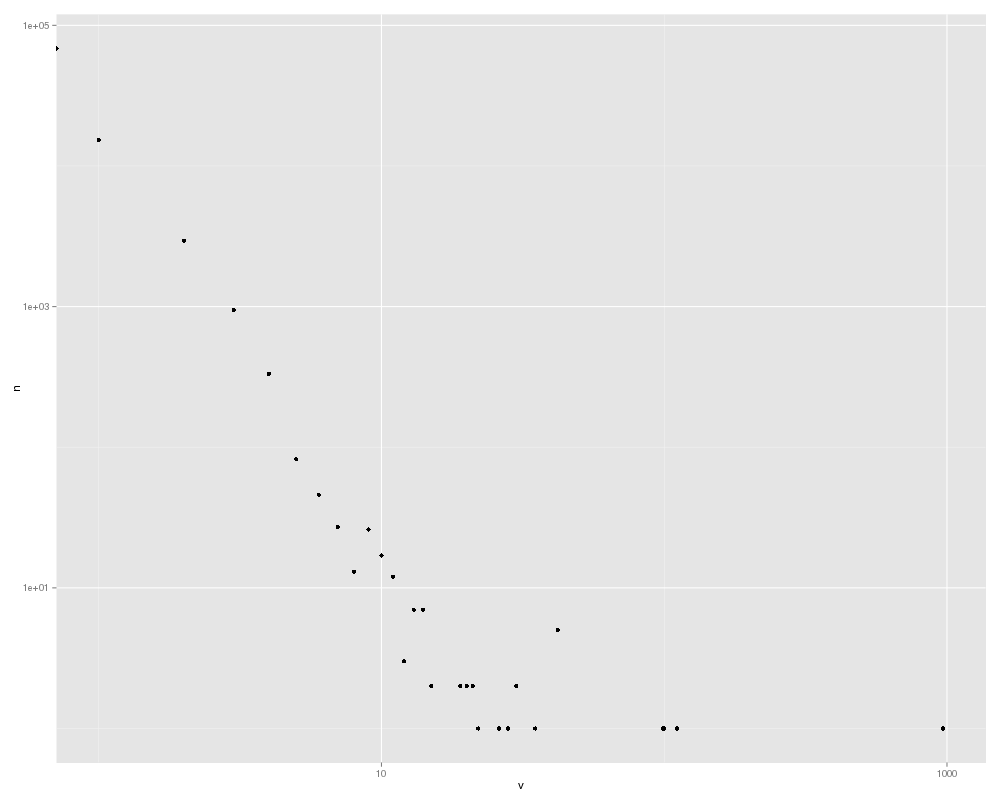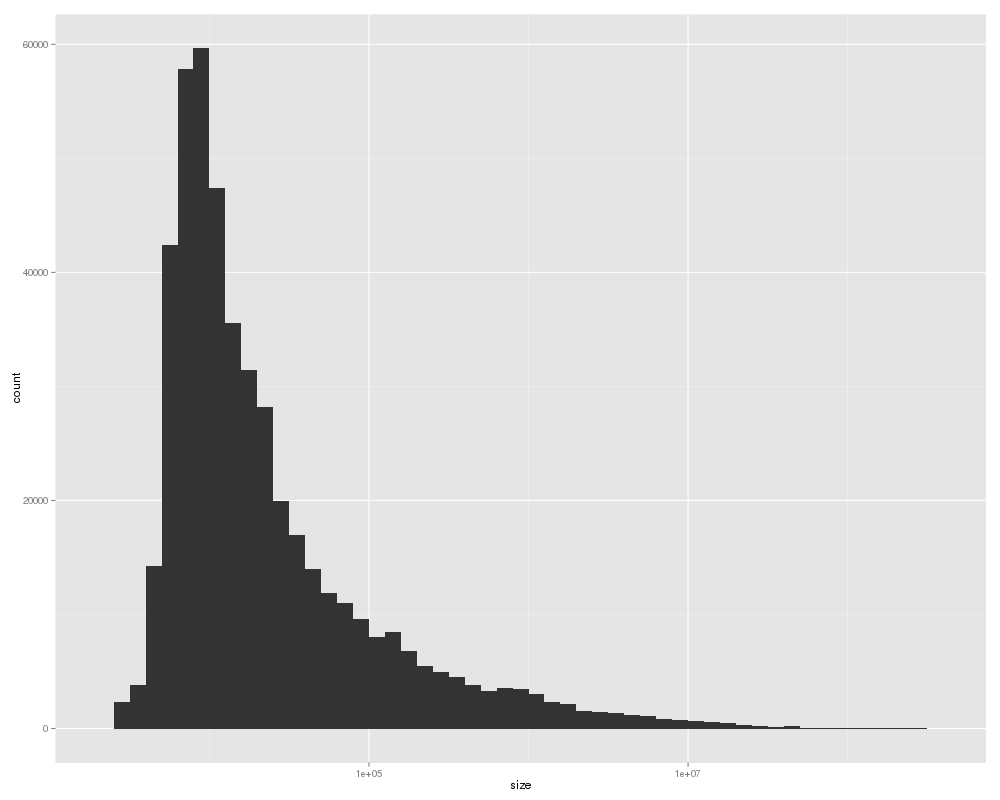Hash.new はどのように使われているのか
% time gmilk -a 'Hash.new' |sed 's/^.*Hash.new */Hash.new /'|sort|uniq -c|sort -n|tail -100
Because number of records is large, Milkode use external tool. (Same as 'gmilk -e grep')
26 Hash.new { |h,k| h[k] = h.length }
26 Hash.new {|h, k| h[k] = [] }
26 Hash.new {|h, k| h[k] = {}}
26 Hash.new {|hash, key| hash[key] = lambda {|entry| CoercibleString.coerce(entry)}}
27 Hash.new (hash)
27 Hash.new (self, env, @default_options)
27 Hash.new { |hash, key|
27 Hash.new { |hash,key| hash[key] = {} }
28 Hash.new ) { |row| ... }
28 Hash.new { |h,k| h[k] = '' }
29 Hash.new ("ETag" => 'HELLO', "content-length" => '123')
29 Hash.new (*args)
29 Hash.new (0) }
29 Hash.new (false)) do |methods, attr|
29 Hash.new , pirate.changes
30 Hash.new ()
30 Hash.new , node.attributes
30 Hash.new { |h,k| h[k] = Mutex.new }
30 Hash.new }.should raise_error(ArgumentError)
31 Hash.new (header)
32 Hash.new (false).update(
32 Hash.new ;
33 Hash.new ) }
34 Hash.new ("default")
34 Hash.new (self, env)
35 Hash.new (0)]
35 Hash.new { |hash,key| hash[key] = [] }
36 Hash.new ({
36 Hash.new { |h, k|
37 Hash.new (0)) { |h,part| h[part.first] += part.last; h }
37 Hash.new ]
37 Hash.new { |h, k| h[k] = Array.new }
37 Hash.new {|h,base|
38 Hash.new { |h, k| h[k] = Set.new }
39 Hash.new (0.0)
39 Hash.new { |h, k| h[k] = Type.new(k) unless k.blank? }
42 Hash.new { [] }
43 Hash.new { 0 }
43 Hash.new { |h,k| h[k] = 0 }
43 Hash.new { |h,pid| h[pid] = {} }
44 Hash.new (1)
44 Hash.new (self)
44 Hash.new do |hash, key|
44 Hash.new {|h,k| h[k] = 0}
46 Hash.new (nil)
46 Hash.new , &block)
46 Hash.new {|hash,key| hash[key.to_s] if Symbol === key }
47 Hash.new ("foo" => ["bar", "baz"])
47 Hash.new (output)
48 Hash.new ("")
48 Hash.new {|hash, key| hash[key] = []}
50 Hash.new (Codepoint.new)
50 Hash.new .tap do |hash|
50 Hash.new Hash(getRuntime());
53 Hash.new ("Foo-Bar" => "baz")
54 Hash.new { |h,k|
56 Hash.new (default)
56 Hash.new do |h, table_name|
58 Hash.new ("Content-MD5" => "d5ff4e2a0 ...")
58 Hash.new unless defined?(@_cycles)
59 Hash.new (default).merge!(self)
60 Hash.new ([]))
60 Hash.new (default).merge(self)
63 Hash.new { |hash, key| hash[key] = {} }
65 Hash.new { |hash, key| hash[key] = Array.new }
66 Hash.new (
67 Hash.new (0)
67 Hash.new { |h, k| h[k] = 0 }
69 Hash.new { |h, k| h[k] = k.chr }
75 Hash.new { |h,k| h[k] = Array.new }
76 Hash.new {|h,k| h[k] = {}}
84 Hash.new ('')
95 Hash.new ({})
99 Hash.new { |h, k| h[k] = {} }
102 Hash.new {|h, k| h[k] = []}
103 Hash.new do |h, k|
108 Hash.new , params
119 Hash.new Hash(runtime);
121 Hash.new ,
126 Hash.new do |h,k|
133 Hash.new {|h,k| h[k] = [] }
136 Hash.new (false)
139 Hash.new 0
144 Hash.new ([])
160 Hash.new ("foo" => "bar")
162 Hash.new do |hash, region|
162 Hash.new do |region_hash, key|
261 Hash.new (headers)
262 Hash.new { |hash, key| hash[key] = [] }
285 Hash.new { |h,k| h[k] = {} }
308 Hash.new {|h,k| h[k] = []}
429 Hash.new ()
448 Hash.new { |h, k| h[k] = [] }
789 Hash.new { |h,k| h[k] = [] }
827 Hash.new
1015 Hash.new }
1038 Hash.new do |hash, key|
1220 Hash.new )
1672 Hash.new (0)
17878 Hash.new
gmilk -a 'Hash.new' 1.42s user 0.20s system 98% cpu 1.645 total
sed 's/^.*Hash.new */Hash.new /' 0.10s user 0.00s system 6% cpu 1.644 total
sort 0.14s user 0.00s system 8% cpu 1.782 total
uniq -c 0.00s user 0.01s system 0% cpu 1.782 total
sort -n 0.02s user 0.00s system 1% cpu 1.799 total
tail -100 0.00s user 0.00s system 0% cpu 1.798 total
Hash.new { |h,k| h[k] = [] } がとても多いな。

